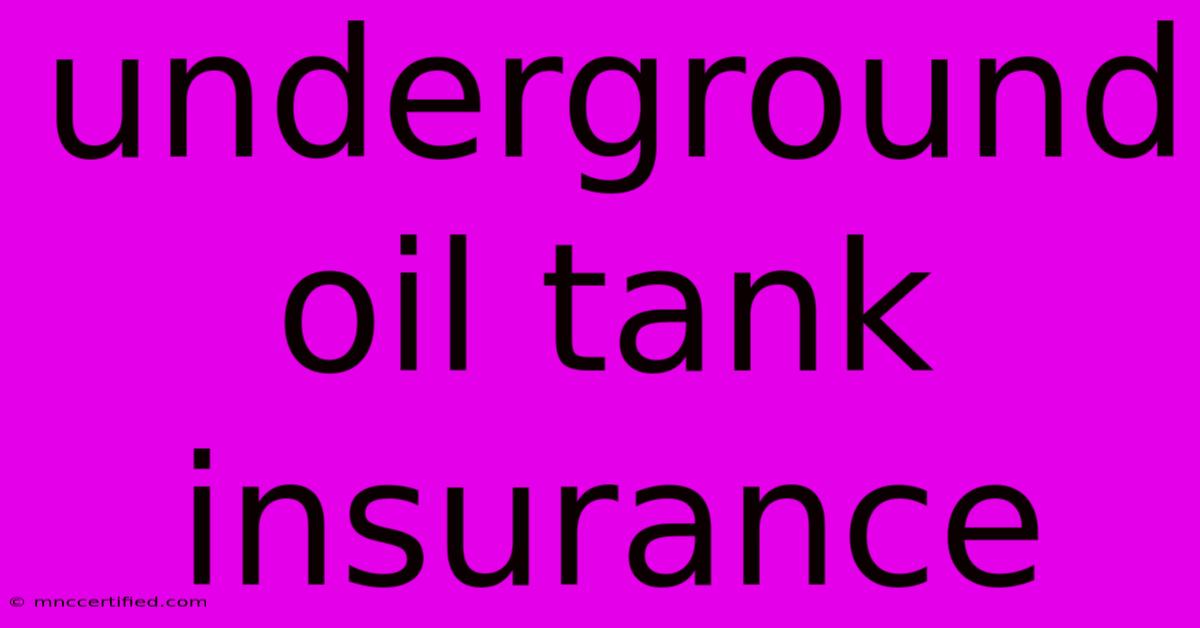Underground Oil Tank Insurance

Table of Contents
Underground Oil Tank Insurance: Protecting Your Property and Finances
Underground oil tanks, while once common, now present significant environmental and financial risks. Leaking tanks can contaminate soil and groundwater, leading to expensive cleanup costs and potential legal liabilities. This is where underground oil tank insurance becomes crucial. This comprehensive guide explores everything you need to know about this vital coverage, helping you understand its importance and how to secure the right policy.
Understanding the Risks of Underground Oil Tanks
Before diving into insurance, it's essential to understand the potential hazards associated with underground oil tanks. These include:
- Environmental Contamination: Leaks can contaminate soil and groundwater, harming ecosystems and potentially affecting drinking water supplies. The cleanup process can be incredibly costly and time-consuming.
- Legal Liabilities: If your tank leaks and causes contamination, you could face significant legal fees and penalties. Neighboring properties could also sue you for damages.
- Property Damage: A leaking tank can damage your own property, requiring costly repairs or even demolition.
- Business Interruption: If your business relies on an underground oil tank, a leak can disrupt operations, leading to lost revenue and potential closure.
What Does Underground Oil Tank Insurance Cover?
Underground oil tank insurance, also sometimes called environmental insurance or pollution liability insurance, protects you from the financial burdens associated with leaks and spills. Coverage typically includes:
- Cleanup Costs: This covers the expenses associated with remediating contaminated soil and groundwater. This can include excavation, removal of contaminated material, and environmental monitoring.
- Legal Defense Costs: The policy will help cover legal fees incurred in defending yourself against lawsuits related to the leak.
- Third-Party Liability: This protects you from claims made by third parties who suffer losses due to contamination from your tank.
- Regulatory Fines and Penalties: Coverage can help offset fines and penalties imposed by environmental agencies.
Important Note: Policies vary significantly, so carefully review the specific coverage offered by each insurer. Some policies may have limitations on coverage amounts or exclusions for specific types of contamination.
Who Needs Underground Oil Tank Insurance?
While not mandatory in all areas, underground oil tank insurance is highly recommended for anyone who owns or operates a property with an underground oil tank, including:
- Homeowners: If you have an old oil tank on your property, even if it's not currently in use, you should consider insurance.
- Business Owners: Businesses using underground oil tanks for heating, manufacturing, or other purposes are particularly vulnerable and need robust coverage.
- Property Managers: Managers responsible for properties with underground oil tanks need to ensure adequate insurance protection.
- Landowners: Even if you don't own the tank, you could be held liable for contamination on your property.
Finding the Right Underground Oil Tank Insurance Policy
Choosing the right policy requires careful consideration. Here's what to look for:
- Coverage Limits: Ensure the policy's coverage limits are sufficient to cover potential cleanup costs and liabilities.
- Exclusions: Understand what the policy doesn't cover, such as pre-existing contamination or specific types of pollutants.
- Deductible: Consider your risk tolerance and budget when choosing a deductible.
- Insurer Reputation: Choose a reputable and financially stable insurer with experience in environmental insurance.
- Policy Renewal: Understand the terms of policy renewal and potential premium increases.
Key Factors Affecting Premiums:
Several factors influence the cost of your underground oil tank insurance premium. These include:
- Tank Age and Condition: Older tanks are considered higher risk.
- Tank Location: The proximity to water sources or sensitive environments can affect premiums.
- Tank Size and Capacity: Larger tanks generally carry higher premiums.
- Type of Fuel Stored: The type of fuel stored in the tank can influence the risk assessment.
- Claims History: Prior claims can lead to higher premiums.
Taking Preventative Measures
While insurance is crucial, preventative measures can significantly reduce your risk:
- Regular Inspections: Schedule regular inspections to detect potential leaks early.
- Proper Maintenance: Ensure your tank is properly maintained and meets all safety regulations.
- Tank Removal: Consider removing the tank altogether if it's old or showing signs of deterioration.
Underground oil tank insurance is a critical component of risk management for property owners. Understanding the potential risks and securing appropriate coverage can protect your finances and your property from the devastating consequences of a tank leak. Don't hesitate to consult with an insurance professional to find the right policy for your specific needs. Remember to always thoroughly research and compare quotes from multiple insurers before making a decision.

Thank you for visiting our website wich cover about Underground Oil Tank Insurance. We hope the information provided has been useful to you. Feel free to contact us if you have any questions or need further assistance. See you next time and dont miss to bookmark.
Featured Posts
-
Lithuania Dhl Crash Sabotage Alleged
Nov 27, 2024
-
Do Nutritionist Take Insurance
Nov 27, 2024
-
St Johnstone Fan Zone Aberdeen Alcohol Plan Rejected
Nov 27, 2024
-
Del Toro Insurance Cerca De Mi
Nov 27, 2024
-
Young Defender In Flicks Brest Squad
Nov 27, 2024